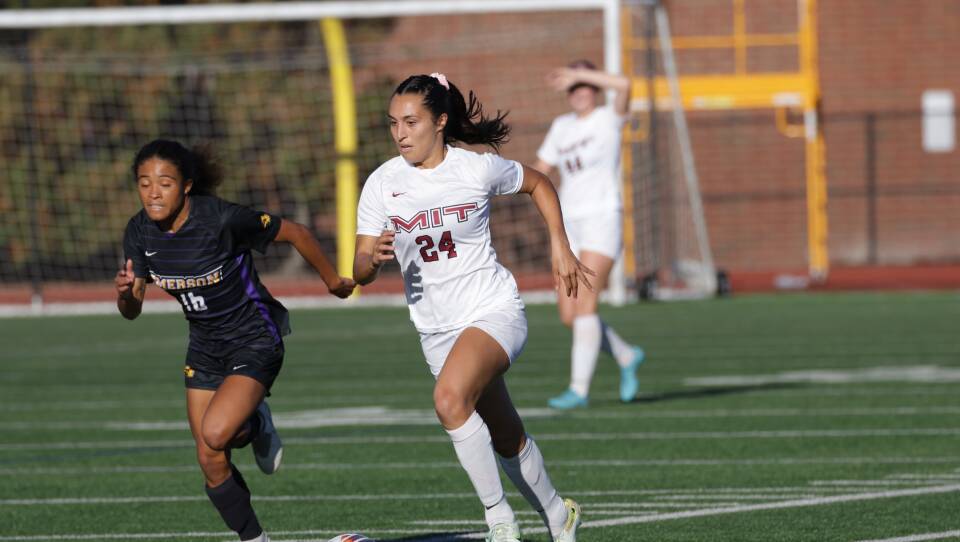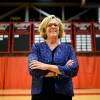When you scroll down a list of 22-year-old Karenna Groff’s achievements, you get the feeling that there’s nothing she can’t do.
Her work as an EMT. Humanitarian efforts to reduce maternal mortality in southern India. And athletic honors, like being a two-time All-American, ranking second all-time in goals and points for MIT women's soccer, and making first-team all-conference in the New England Women's and Men's Athletic Conference three times.
But even Groff, who helped lead the Engineers to the Elite Eight in 2021— the deepest tournament run in program history — was caught by surprise when she was named the NCAA Woman of the Year on Thursday.
“I think there were so many women in consideration that were just, like, so incredible, I honestly did not think it was in the cards for me,” the forward said with a chuckle. “So, I was kind of in shock when they called my name.”
The Woman of the Year Award, which started in 1991, honors women graduating from their schools who have made a mark athletically, academically and as leaders in their communities.
The award caps off a stellar college career for the Weston native, who will graduate with a master's degree later this semester and is applying to medical school. And while the honor may have been a shock to Groff, those who know her well say they're not surprised in the least.
Martin Desmarais is the head coach of MIT women’s soccer. He remembers Groff’s contributions to the team starting almost immediately in the first game of her freshman season. That's when, he says, Groff scored a goal against Carleton College with just seconds left in the game.
“She was playing so well, I leave her out there at the end and it’s like, the clock is just ticking down. And it’s like, ‘Man, we’re gonna lose to a team that we outshot by like 25,’” he remembers.
But Groff worked her magic, scoring a left-footed shot that sent the contest into overtime.
"And that’s her first college goal, which is maybe one of the better goals I’ve seen in my time coaching,” Desmarais said.
It was evident that this player was special from the get-go — and that's uncommon at just about any level of college athletics.
“She just had the drive and talent to have an impact from the start,” Desmarais said. “I think that’s what special about her. She has an amazing moment every year of her career. And I’ve had All-Americans who didn’t even start ‘til they were juniors. So I think that’s definitely one of the things that will leave a lasting impression, I think, in terms of her impact on MIT.”
Working toward a larger goal
Groff says she’s been playing the game for nearly as long as she can remember. And she credits the lessons she’s learned in soccer — working with others toward a larger goal, accepting criticism, giving feedback — to helping her beyond the game, too.
She worked to combat COVID-19 with the MIT Slums and Informal Settlement research group, trying to determine how the pandemic impacted high-poverty areas. And in 2020, she co-founded OpenPPE, a project to help provide personal protective equipment during the shortages early in the pandemic.
Groff also helped implement software that aims to reduce maternal mortality in Tamil Nadu, India. She’s worked as an EMT for MIT EMS.
For Anthony Grant, the director of athletics at MIT, Groff’s approach to soccer isn’t about scoring the most goals or being the flashiest. Rather, it's simply about making the right plays to help her team get better.
“And I think that’s how Karenna approaches everything,” he said. “’How can I make a difference?’”
She’s worked with Soccer Without Borders and South End Soccer to help increase access to the game. She credits that drive to her high school best friend, Ash Baird, who died from cancer during Groff’s senior year.
Her late friend was a champion for equity, Groff said, and that’s made the Woman of the Year honor even more important.
“This recognition is extra special for me just knowing that it was something that was so important to her and just seeing it as a recognition that maybe I am doing that, which was always kind of a big goal of ours,” she said.
Groff hopes to become a physician like her parents, eyeing neurology as a potential field. But she also wants to take the bioengineering skills she’s built at MIT to help develop gene therapies and other advancements that could help on a larger scale.
“You know, being a woman in sports and seeing how far female sports have come, woman sports have come over the past 50, 100 years has been really special. And kind of using sports as a platform to drive forward equity in all these different walks of life has always been something that I want to be a part of,” she said. “So, my next area that I’m really focused on is healthcare and I want to keep forward equity and access in healthcare.”








